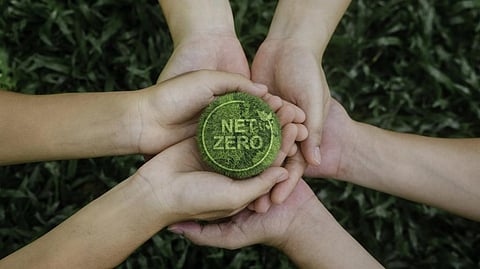Carbon Controversy: Corporate climate action watchdog’s new decision regarding use of offsetting causes backlash
A contentious recent decision by the Science Based Targets Initiative (SBTi), permitting carbon offsetting for Scope 3 emissions of businesses with SBTi-based climate targets, has stirred controversy and skepticism.
Supported by CDP, the UN Global Compact, the We Mean Business Coalition, the World Resources Institute (WRI), and the World-Wide Fund for Nature (WWF), SBTi is essentially a standards-setting body for corporate climate targets. It also reviews climate targets that large companies have set against its given framework and validates those that meet its stringent criteria. It is widely considered one of the most stringent climate standards in the world.
SBTi guides businesses in setting greenhouse gas (GHG) emission reduction targets through what are called ‘Science Based Targets (SBT)’, which are based on the standards, tools and guidance developed by the initiative. Over 4,000 global big and small companies have set SBTs based on SBTi’s guidance, including Indian companies such as those part of the Tata Group, Mahindra Group, Adani Group and Wipro. SBTi’s frameworks have evolved into the most widely adopted standard for corporate climate action over the years.
The issue
The SBTi board of trustees, in a recently issued statement, announced its decision to extend the use of ‘environmental attribute certificates’ (EAC) for the purpose of abatement of Scope 3 emissions. SBTi defines EACs to include emission reduction credits (or carbon credits), and energy certificates.
Scope 3 emissions are all the indirect emissions stemming from a company’s value chain, including emissions from suppliers and customers, but excluding direct emissions from the company’s own operations, which are Scope 1 emissions, and indirect emissions from purchased electricity, which are Scope 2 emissions. For example, in the automobile industry, Scope 3 emissions might encompass emissions from the production of components by suppliers, transportation of raw materials, vehicle use by customers, and disposal of end-of-life vehicles.
Scope 3 emissions are difficult to measure; their nature varies widely from sector to sector, making it often challenging to measure and report all relevant emissions. However, Scope 3 emissions also disproportionately represent the largest quantity of a company’s emissions. CDP’s analysis of emissions across all sectors revealed that Scope 3 emissions, on average, account for 75 per cent of Scope 1+2+3 emissions. A new analysis, ‘The Corporate Climate Responsibility Monitor (CCRM) 2024’, by the New Climate Institute and Carbon Market Watch, reveals that Scope 3 emissions could go up to as much as 99 per cent, as seen in the automobile sector, for instance. This makes measuring, reporting, and reducing Scope 3 emissions incredibly important for companies.
In SBTi’s Corporate Net-Zero Standard Criteria, issued as recently as March 2024, the standard does not permit the use of carbon credits to count as emission reductions toward a company’s near-term or long-term SBTs.
Instead, they are only to be considered as an option for neutralising ‘residual emissions’, which are emissions that persist after a company has achieved its long-term SBTs, or they can be used for financing additional climate mitigation efforts beyond their science-based emission reduction targets, extending beyond their value chain.
The controversy
The Corporate Climate Responsibility Monitor (CCRM) 2024 highlights the potential consequences of allowing carbon offsets for Scope 3 emission. It argues that such a practice could effectively absolve companies of accountability for a significant portion of their emissions, focusing attention primarily on Scope 1 and 2 emissions, which constitute a smaller share of a company’s total emissions.
In September 2023, submissions were solicited for a call to evidence on the effectiveness of EACs such as carbon offsets, which was being reviewed by a technical council. This new decision to allow offsetting has led to accusations against the SBTi board of sidestepping the process by not informing the technical council.
There has been a growing push for the use of carbon offsetting to address businesses’ Scope 3 emissions. The Voluntary Carbon Market Initiative (VCMI), formed to guide corporate buyers on the use of high-integrity carbon credits, launched a “Beta Scope 3 Flexibility Claim” a few months ago, allowing carbon credits to be used to offset up to 50 per cent of Scope 3 emissions. The Integrity Council for the Voluntary Carbon Market (ICVCM), a body setup to ‘validate’ high integrity carbon credits, welcomed SBTi’s decision on April 10. Carbon market participants have also welcomed the announcement with renewed hopes of there being a boost in demand for offsets in the voluntary market.
Studying individual company targets, The New Climate Institute, in its analysis, shows that if the Beta Scope 3 Flexibility Claim is considered, companies like Apple and H&M Group would only need to reduce emissions by 20 per cent and 2 per cent, respectively. Other companies would no longer need to reduce emissions, in fact, companies like Mercedes-Benz, Volkswagen Group, and Deutsche Post DHL could increase their emissions covered by Scope 3 targets by 20 per cent, 40 per cent, and 50 per cent, respectively.
Staff members of SBTi wrote a letter protesting against the decision, calling it problematic and demanding the resignation of the chief executive and board members.
The decision by SBTi, given its reputation for establishing the scientific underpinning of corporate climate action, is concerning. For one, because it contrasts sharply with the dubious history of the carbon offsetting market, which has come under fire for widespread greenwashing practices. Some have also questioned the scientific basis of this decision, more so because the Standard and SBTi itself need to live up to its name. Without sufficient guardrails and stringent oversight, there is a risk of writing off the responsibility of businesses to actually reduce the overall emissions of their supply chain. This could also mislead people into believing that corporates are actually reducing emissions and going green under their science-based targets.

